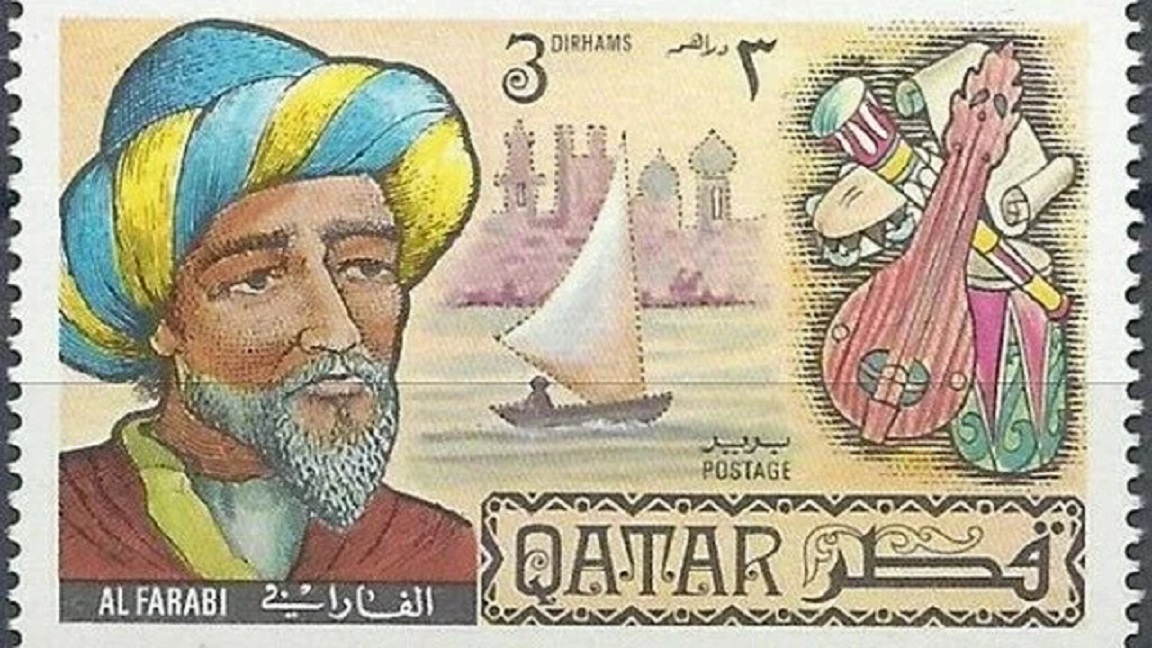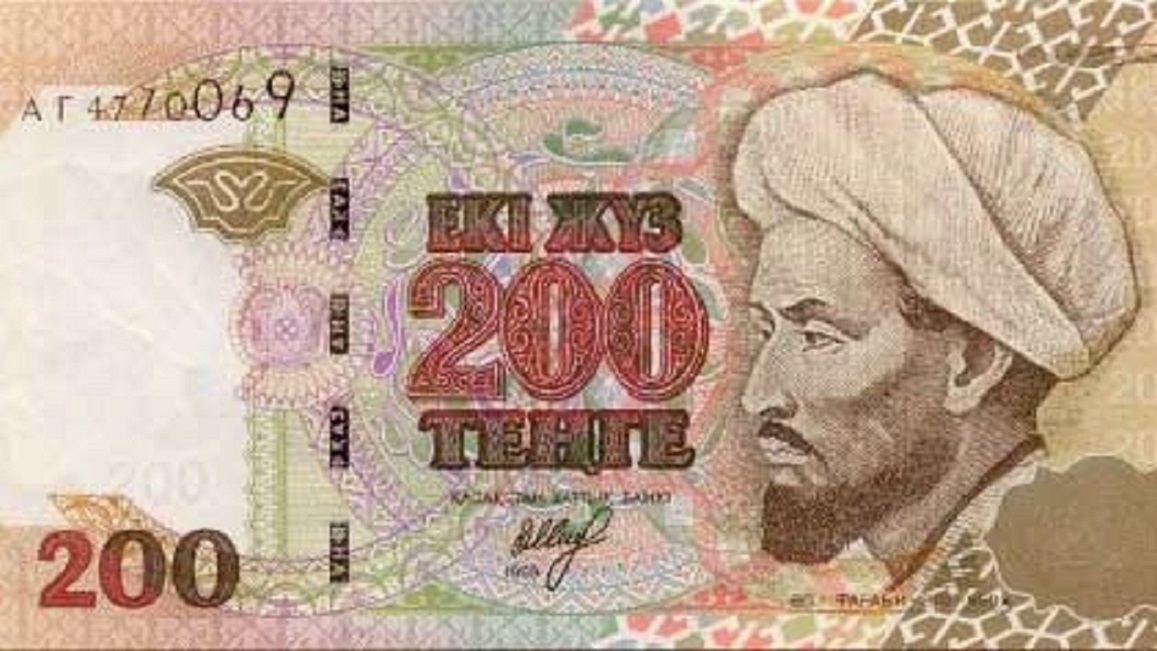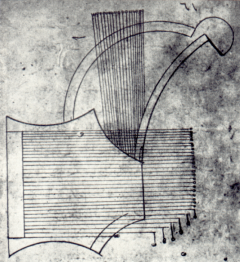Known in the west as Alpharabius, the intellectual had a significant influence in a number of disparate fields, especially music and Aristotelian philosophy

Al-Farabi is known for his theories on the ideal society, as well as on music
(Public domain)
By Nadda Osman
11 August 2022
Little is known for certain about Abu Nasr al-Farabi’s origins but many historians suspect he was born somewhere in central Asia around 878 CE and was likely of Persian origin.
Known as Alfarabius by medieval Latin scholars, Farabi was a Muslim polymath who lived during the early stage of what has come to be known as the “Islamic golden age”.
The term refers to a period starting in the late ninth century and lasting until around the mid-13th century in which Muslim scholars working primarily in the Arabic language made great advances in the sciences, philosophy, and mathematics, among other fields.
Farabi made significant contributions to these areas of study, but his standout work was on Aristotelian philosophy.
Like other Muslim intellectuals of the era, Farabi’s influence lay not only in his original ideas but also because he helped preserve the ancient Greek scholarship that became available to the Muslim world after the Islamic conquest of the Levant in the seventh century.
In particular, Farabi and his peers made the works of Greek philosophers more accessible with their commentaries and explanations.
Who was al-Farabi?
The Muslim scholar grew up in Damascus and lived during the rule of the Abbasid caliphs, to whom he offered his services.
As he did not write an autobiography, more is known about his ideas than the man himself.
Nevertheless, his name suggests Persian ancestry and he lived during a period when non-Arab officers were able to advance to higher ranks in Muslim armies.
Many historians suspect that his father was a military officer of Persian origin and that he was probably born in what is today Afghanistan. Others believe that Kazakhstan or Uzbekistan are more likely candidates for his birthplace.

A stamp issued in Qatar in 1971 commemorates al-Farabi (Wikimedia )
Secondary sources describe Farabi as an introverted character who spent most of his time studying in the Abbasid capital of Baghdad.
Some sources suggest that he was influenced by the Sufi tradition of Islam and that he spent time in the city of Bukhara, which is in what is Uzbekistan today, and was once a major centre for Islamic learning.
During a prolific career, Farabi worked as a jurist and academic, producing works on logic, metaphysics, ethics, politics, music, and medicine, as well as other fields.
Greek inspiration
Farabi is most widely known for his commentaries on Aristotle and Plato’s works, which he published in his book, Philosophy of Plato and Aristotle. The book includes summaries and interpretations of their works and goes into topics such as the origins of modern philosophy.
The Muslim philosopher's ideas on logic (mantiq) stated that the notion originated from the concept of speech. Ancient philosophers used an inward speech to articulate concepts that lack a physical form.
In his book The Attainment of Happiness, Farabi wrote that the ultimate point of logic was to achieve happiness because that was the purpose of life and the main reason for human existence. Accordingly, anything that obstructs a person from achieving happiness is evil.
Secondary sources describe Farabi as an introverted character who spent most of his time studying in the Abbasid capital of Baghdad.
Some sources suggest that he was influenced by the Sufi tradition of Islam and that he spent time in the city of Bukhara, which is in what is Uzbekistan today, and was once a major centre for Islamic learning.
During a prolific career, Farabi worked as a jurist and academic, producing works on logic, metaphysics, ethics, politics, music, and medicine, as well as other fields.
Greek inspiration
Farabi is most widely known for his commentaries on Aristotle and Plato’s works, which he published in his book, Philosophy of Plato and Aristotle. The book includes summaries and interpretations of their works and goes into topics such as the origins of modern philosophy.
The Muslim philosopher's ideas on logic (mantiq) stated that the notion originated from the concept of speech. Ancient philosophers used an inward speech to articulate concepts that lack a physical form.
In his book The Attainment of Happiness, Farabi wrote that the ultimate point of logic was to achieve happiness because that was the purpose of life and the main reason for human existence. Accordingly, anything that obstructs a person from achieving happiness is evil.

A statue of al-Farabi is seen in front of the Kazakh National State University
(Wikimedia Commons)
The pursuit of happiness was made up of four virtues, including the theoretical (knowledge of what is true and good), the deliberative (knowledge of how to attain what is good), the moral (desire for good), and practical acts (conduct to attain what is good).
His work was also influenced by Islamic theology and he distinguished between worldly happiness and that of the afterlife, which Muslims are meant to strive towards.
When describing the soul, Farabi combined religion with science. He subscribed to Plato’s idea that the human soul had three main parts, including the appetitive (our desires), the spirited (our emotions), and the rational (our reason), which should all work together in harmony to allow us to be our best.

An illustration from al-Farabi's 'The Book of Music' (Wikimedia )
The best example of these parts working in harmony was the Prophet Muhammad, who Muslims consider the human ideal.
Everyone else, according to Farabi, could move towards this ideal but were not inherently in harmony.
Another Greek influence came in the form of Plato’s ideal community described in his work The Republic.
Engagement with other human beings formed part of the pursuit of happiness described above and Farabi described his own ideal society in a work titled: Opinions of the Inhabitants of the Virtuous City.
In this vision of the ideal state, the world is made up of nations, which are in turn made up of city-states that uphold a mixture of platonic and Islamic virtues, such as piety, moderation, unity, and justice.
Such a community stood in contrast to defective cities, which he described as containing citizens who do not seek knowledge and are instead caught up in the pursuit of wealth, power, and pleasure.
Farabi condemned such societies for their rejection of God, morality, and the idea of the afterlife.
Rulers of virtuous societies were the inheritors of prophets and were tasked with ensuring group happiness, according to Farabi.
On Music
One of Farabi’s most renowned contributions to scholarship is his book Kitab al-Musiqa (The Book of Music).
This musical treatise was one of the most comprehensive produced in the Islamic world and discusses the elements of composition and the role of instruments, as well as the philosophy, theory, and practice of music.
Farabi was one of the first scholars of music to study the music of the Turkic people and one of the earliest to systematise the study of music with a system of common notations and rules to write down compositions and rhythms.
A linguist and logician himself, the scholar saw similarities between the structure of music and the structure of poetry and logic.
The best example of these parts working in harmony was the Prophet Muhammad, who Muslims consider the human ideal.
Everyone else, according to Farabi, could move towards this ideal but were not inherently in harmony.
Another Greek influence came in the form of Plato’s ideal community described in his work The Republic.
Engagement with other human beings formed part of the pursuit of happiness described above and Farabi described his own ideal society in a work titled: Opinions of the Inhabitants of the Virtuous City.
In this vision of the ideal state, the world is made up of nations, which are in turn made up of city-states that uphold a mixture of platonic and Islamic virtues, such as piety, moderation, unity, and justice.
Such a community stood in contrast to defective cities, which he described as containing citizens who do not seek knowledge and are instead caught up in the pursuit of wealth, power, and pleasure.
Farabi condemned such societies for their rejection of God, morality, and the idea of the afterlife.
Rulers of virtuous societies were the inheritors of prophets and were tasked with ensuring group happiness, according to Farabi.
On Music
One of Farabi’s most renowned contributions to scholarship is his book Kitab al-Musiqa (The Book of Music).
This musical treatise was one of the most comprehensive produced in the Islamic world and discusses the elements of composition and the role of instruments, as well as the philosophy, theory, and practice of music.
Farabi was one of the first scholars of music to study the music of the Turkic people and one of the earliest to systematise the study of music with a system of common notations and rules to write down compositions and rhythms.
A linguist and logician himself, the scholar saw similarities between the structure of music and the structure of poetry and logic.

A statue of al-Farabi in front of the Kazakh National State University in Nursultan, Kazakhstan (Wikimedia)
He argued that just as poetry was formed from a finite grouping of letters in the form of an alphabet, music was also formed from a finite palette of sounds. The concept of this catalogue of sounds was determined by nature.
According to Farabi, the music of a particular culture allowed an academic to learn more about different peoples, as their particular nature and characteristics had an impact on their musical tastes.
Farabi died at the age of 80 in Damascus but his legacy inspired Muslim and Western scholars for centuries to come.
Today postage stamps are issued in his honour in parts of the Muslim world and an asteroid belt is named after him.
Authorities in Kazakhstan, one of the candidates for being his birthplace, have also constructed a statue of the polymath in their country’s capital, Nursultan.
He argued that just as poetry was formed from a finite grouping of letters in the form of an alphabet, music was also formed from a finite palette of sounds. The concept of this catalogue of sounds was determined by nature.
According to Farabi, the music of a particular culture allowed an academic to learn more about different peoples, as their particular nature and characteristics had an impact on their musical tastes.
Farabi died at the age of 80 in Damascus but his legacy inspired Muslim and Western scholars for centuries to come.
Today postage stamps are issued in his honour in parts of the Muslim world and an asteroid belt is named after him.
Authorities in Kazakhstan, one of the candidates for being his birthplace, have also constructed a statue of the polymath in their country’s capital, Nursultan.
Published on February 14, 2017


Farzan J. Chishti
Alpharabius - A master of solving intellectual jigsaw puzzles, navigated and shaped the humanistic thoughts of a period now referred to as the as the Golden Age of the East. Al-Farabi made a fundamental contribution to Arabic literature and produced Arabic commentary and interpretation of Aristotle, Plato, and other ancient classics at a time when European were heedless about the Greek Language, and neither had the taste to understand the Greek contribution. In fact, it took about two hundred years for Al- Farabi’s commentary to be translated into Latin, by which Greece became the foundation of Western cultural history as per record.
For a long time I've been thinking about seriously understanding logic from a serious and well-grounded effort just to know that the decisions i make in my life are the right ones. The more I ponder about, what is actually logical, the more grainy and hazy things become, to me logic can be quite elusive. Actually i have been wondering if the same metrics, variables, characteristics that apply and create beauty and serenity in music, art, design, poetry, so on and so forth, could be somehow applied to create a well frame-worked civic society, one that functions with beauty and grace. But such things are easier said than done, its hard to combine practice with theory. Especially with innovative ideas regarding areas where new things don't happen much or is frowned upon. The solutions might lie somewhere else, people might just be looking in the wrong box. This is why I feel it is quite important, to look at scenarios from multiple perspectives and a have a multi-disciplinary understanding of things. This enables humanity to push the boundaries and achieve overall progress with regards to the human condition.
Al-Farabi also known as Alpharabius in the western circles was a man of multiple disciplines. He explored areas such as political philosophy, ethics, metaphysics, ethics, and logic. One of the quotes he is well known for is “An isolated individual could not achieve all the perfections by himself, without the aid of other individuals.” One possible interpretation of this thought is that one cannot perform in isolation in order to grow or prosper.
He stated “It is the innate disposition of every human to join others in the labor they ought to perform. In order to achieve what they can of that perfection, every man needs to stay in the neighborhood of others and associate with them." He came up with such ideas in 872 in his text Al-Madina al-Fadila.
Alpharabius's contribution to Philosophy was so deep that there is a school of thought named after him, commonly referred to as Farabism, this school of thought was later forgotten when Avicennism took over. Regardless what was highly important about Farabism is that it broke with the philosophy of Plato and Aristotle, since it jumped from metaphysics to methodology. Many scholars are of the opinion that his research can be interpreted as pre-cursor to modernity.
Al-Farabi was one of the few who united theory and practice, thus he was pushing the limits of human knowledge. He had a great influence on science and philosophy for several centuries and is widely regarded and second only to Aristotle in understanding the depth of human condition.
Al-Farabi viewed religion as a symbolic rendering of the truth. His life goal as a philosopher was to provide guidance to the state. Just like senior management gives governance/consulting advise to external organizations and their subordinates before, during, after a project. Al-Farabi’s goal was to provide guidance to the state aiming for peace & progress.
Al-Farabi’s argument was that the ideal state was the city of Medina which was governed by the Prophet Muhammed (P.B.U.H) as the head of state, because the Prophet was in direct communion with Allah, via Arch-Angel Gabriel and sacred text/law was revealed to him without a barrier as opposed to regular people.
Almost everyone who’s into the art scene knows that Pablo Picasso was a genius, he is known for cubism, the most influential avant-garde movement of the 20th century. Anyone who’s ever about read about technology understands Steve Job’s immense contribution to the technology industry. But Geniuses do not always work on their own. Their ideas and concepts are implemented by others and the outcome results in innovation and growth. Similarly Al-Farabi a.k.a Alpharabius was a genius in his own right.
The article is only serves as a guide to people who are seeking the truth.

Farzan J. Chishti
Alpharabius - A master of solving intellectual jigsaw puzzles, navigated and shaped the humanistic thoughts of a period now referred to as the as the Golden Age of the East. Al-Farabi made a fundamental contribution to Arabic literature and produced Arabic commentary and interpretation of Aristotle, Plato, and other ancient classics at a time when European were heedless about the Greek Language, and neither had the taste to understand the Greek contribution. In fact, it took about two hundred years for Al- Farabi’s commentary to be translated into Latin, by which Greece became the foundation of Western cultural history as per record.
For a long time I've been thinking about seriously understanding logic from a serious and well-grounded effort just to know that the decisions i make in my life are the right ones. The more I ponder about, what is actually logical, the more grainy and hazy things become, to me logic can be quite elusive. Actually i have been wondering if the same metrics, variables, characteristics that apply and create beauty and serenity in music, art, design, poetry, so on and so forth, could be somehow applied to create a well frame-worked civic society, one that functions with beauty and grace. But such things are easier said than done, its hard to combine practice with theory. Especially with innovative ideas regarding areas where new things don't happen much or is frowned upon. The solutions might lie somewhere else, people might just be looking in the wrong box. This is why I feel it is quite important, to look at scenarios from multiple perspectives and a have a multi-disciplinary understanding of things. This enables humanity to push the boundaries and achieve overall progress with regards to the human condition.
Al-Farabi also known as Alpharabius in the western circles was a man of multiple disciplines. He explored areas such as political philosophy, ethics, metaphysics, ethics, and logic. One of the quotes he is well known for is “An isolated individual could not achieve all the perfections by himself, without the aid of other individuals.” One possible interpretation of this thought is that one cannot perform in isolation in order to grow or prosper.
He stated “It is the innate disposition of every human to join others in the labor they ought to perform. In order to achieve what they can of that perfection, every man needs to stay in the neighborhood of others and associate with them." He came up with such ideas in 872 in his text Al-Madina al-Fadila.
Alpharabius's contribution to Philosophy was so deep that there is a school of thought named after him, commonly referred to as Farabism, this school of thought was later forgotten when Avicennism took over. Regardless what was highly important about Farabism is that it broke with the philosophy of Plato and Aristotle, since it jumped from metaphysics to methodology. Many scholars are of the opinion that his research can be interpreted as pre-cursor to modernity.
Al-Farabi was one of the few who united theory and practice, thus he was pushing the limits of human knowledge. He had a great influence on science and philosophy for several centuries and is widely regarded and second only to Aristotle in understanding the depth of human condition.
Al-Farabi viewed religion as a symbolic rendering of the truth. His life goal as a philosopher was to provide guidance to the state. Just like senior management gives governance/consulting advise to external organizations and their subordinates before, during, after a project. Al-Farabi’s goal was to provide guidance to the state aiming for peace & progress.
Al-Farabi’s argument was that the ideal state was the city of Medina which was governed by the Prophet Muhammed (P.B.U.H) as the head of state, because the Prophet was in direct communion with Allah, via Arch-Angel Gabriel and sacred text/law was revealed to him without a barrier as opposed to regular people.
Almost everyone who’s into the art scene knows that Pablo Picasso was a genius, he is known for cubism, the most influential avant-garde movement of the 20th century. Anyone who’s ever about read about technology understands Steve Job’s immense contribution to the technology industry. But Geniuses do not always work on their own. Their ideas and concepts are implemented by others and the outcome results in innovation and growth. Similarly Al-Farabi a.k.a Alpharabius was a genius in his own right.
The article is only serves as a guide to people who are seeking the truth.
No comments:
Post a Comment